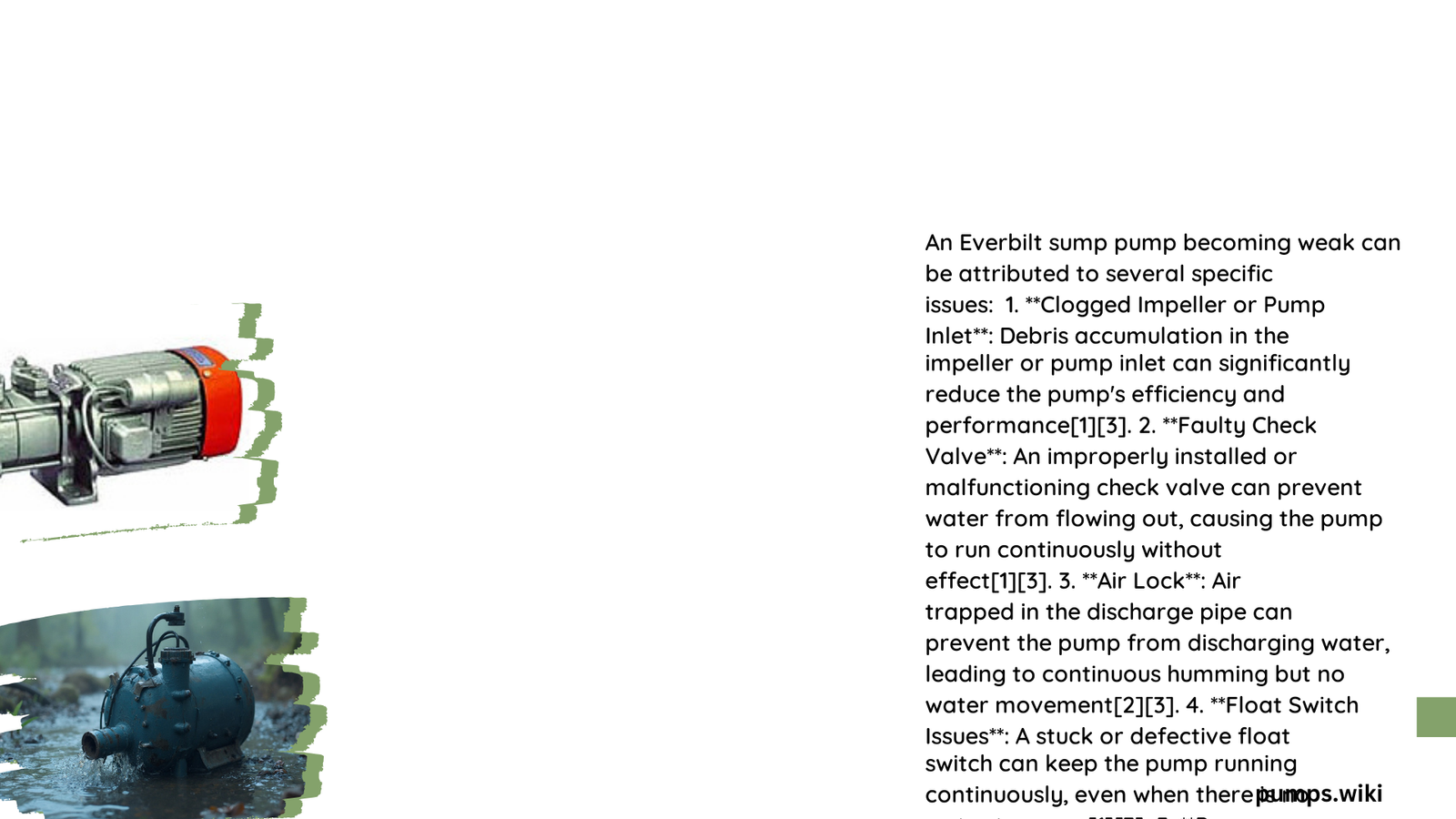An Everbilt sump pump that has become weak can lead to serious water damage in your basement or crawl space. This issue is often characterized by reduced pumping efficiency, unusual noises, or complete failure to remove water. Understanding the signs of a weakening pump, identifying the root causes, and knowing how to troubleshoot can help homeowners prevent potential flooding and extend the life of their Everbilt sump pump system.
What Are the Signs of a Weakening Everbilt Sump Pump?
Recognizing the early signs of a weakening Everbilt sump pump is crucial for preventing water damage. Here are the key indicators:
- Reduced water flow
- Unusual noises (rattling, grinding)
- Excessive vibration
- Intermittent operation
- Failure to turn on or off
- Continuous running
If you notice any of these symptoms, it’s time to investigate further and take action.
Why Does an Everbilt Sump Pump Become Weak?

Several factors can contribute to the weakening of an Everbilt sump pump:
- Age and wear: Most sump pumps have a lifespan of 7-10 years
- Overuse: Constant operation due to high water tables
- Debris accumulation: Clogging of the impeller or inlet
- Electrical issues: Power surges or wiring problems
- Improper installation: Incorrect sizing or setup
Understanding these causes can help in prevention and maintenance.
How Can You Diagnose a Weak Everbilt Sump Pump?
To diagnose a weak Everbilt sump pump, follow these steps:
- Visual inspection:
- Check for visible damage or corrosion
-
Ensure the float switch moves freely
-
Operational test:
- Pour water into the sump pit
-
Observe if the pump activates and removes water efficiently
-
Listen for unusual sounds:
-
Grinding or rattling may indicate impeller damage
-
Check electrical connections:
- Ensure the pump is properly plugged in
-
Inspect for any frayed wires
-
Measure water flow:
- Time how long it takes to pump out a known volume of water
What Are the Common Troubleshooting Steps for a Weak Everbilt Sump Pump?
When your Everbilt sump pump becomes weak, try these troubleshooting steps:
- Clean the pump and pit:
- Remove debris from the impeller and inlet
-
Clear any sediment from the sump pit
-
Check the float switch:
- Ensure it’s not tangled or stuck
-
Adjust if necessary
-
Inspect the check valve:
-
Make sure it’s not stuck or installed backwards
-
Examine the discharge pipe:
- Look for clogs or kinks
-
Ensure proper slope for efficient water flow
-
Test the power supply:
- Use a multimeter to check for proper voltage
- Reset the GFCI outlet if tripped
When Should You Replace Your Everbilt Sump Pump?
Consider replacing your Everbilt sump pump in the following situations:
- Age: If it’s over 7 years old
- Frequent repairs: When repair costs outweigh replacement
- Inadequate capacity: If your water needs have increased
- Visible damage: Cracks, severe corrosion, or motor failure
- Persistent weakness: If troubleshooting doesn’t improve performance
How Can You Maintain Your Everbilt Sump Pump to Prevent Weakness?
Regular maintenance can prevent your Everbilt sump pump from becoming weak:
- Quarterly checks:
- Test the pump by pouring water into the pit
-
Clean the inlet screen and impeller
-
Annual maintenance:
- Remove the pump and clean thoroughly
-
Check all electrical connections
-
Backup power:
-
Install a battery backup system for power outages
-
Professional inspection:
-
Have a plumber inspect the system every 2-3 years
-
Proper pit maintenance:
- Keep the pit clean and free of debris
- Ensure the pit is the correct size for your pump
What Are the Costs Associated with Repairing or Replacing a Weak Everbilt Sump Pump?
Understanding the potential costs can help you decide between repair and replacement:
| Item | Repair Cost | Replacement Cost |
|---|---|---|
| Impeller | $50 – $150 | N/A |
| Float Switch | $30 – $100 | N/A |
| Check Valve | $20 – $80 | N/A |
| Entire Pump | N/A | $150 – $400 |
| Professional Installation | $50 – $200 | $100 – $300 |
Note: Costs may vary based on location and specific model.
How Does a Weak Everbilt Sump Pump Affect Home Safety?
A weak Everbilt sump pump can have serious implications for home safety:
- Increased flood risk
- Potential for water damage to belongings
- Mold and mildew growth
- Structural damage to the foundation
- Decreased property value
Addressing pump weakness promptly is crucial for maintaining a safe and dry home environment.
By understanding the signs of a weakening Everbilt sump pump, knowing how to troubleshoot, and maintaining your system regularly, you can ensure your basement stays dry and your home remains protected from water damage.
References:
1. Cranney Home Services: 10 Signs Your Sump Pump Needs Repair
2. Triad Basement Waterproofing: Top 12 Signs It’s Time To Replace Your Sump Pump
3. Everbilt Utility Pump Troubleshooting Guide
